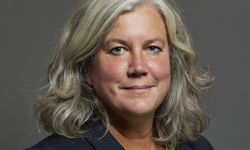There is little new under the sun as Lord Hunt, who took over the chairmanship of the Press Complaints Commission in October before promptly abolishing the body, would be the first to attest.
He had been starting to grapple, as many others have been, with the “Richard Desmond” problem: How can you have self-regulation of the press when any proprietor can unilaterally remove himself from the system in the way that the Daily Express owner departed from the PCC?
For Lord Hunt, the eureka moment came in a meeting with the lawyer and author Geoffrey Robertson QC.
Help from Shawcross
The solution is there in the report of Lord Shawcross’s Royal Commission On The Press 1961-62, Robertson suggested.
In calling for a reformed General Council of the Press with improved funds and powers - something that turned into the Press Council in 1962 – Shawcross suggested a way forward that did not involve legislation.
On page 102 of the report, the Royal Commission argues: “We do not think that the absence of an enabling statute need necessarily be fatal to the activities of such a body. Much of its power can rest on a contractual basis.”
And that is how Lord Hunt, a member of the cabinets of Margaret Thatcher and John Major, almost stumbled against the solution to the Desmond conundrum – tie everyone into the obligations they have agreed to by legally binding commercial contracts for five years at a time.
It is at the heart of his two-page plan for a new regulatory body, which he hopes will convince Lord Justice Leveson and Parliament of the wisdom of avoiding statutory regulation of the press.
In the PCC and throughout the industry there was general agreement, former Welsh Secretary Lord Hunt says, that “the right way forward was to seek a system of contractual obligations or commercial contracts to which everybody would sign who was involved in publishing of newspapers and magazines on and offline.”
Work has been under way in recent weeks producing such a draft contract and Lord Hunt believes that everyone in the industry, including News Corporation chairman Rupert Murdoch and Richard Desmond himself, all support the idea subject to what finally emerges.
“I know that much will depend on the wording of the contract. What I would love, although it is very difficult for we lawyers to do this, is a simple, easy to read, easy to understand contract which is sufficiently flexible to adapt to changing circumstances,” says Lord Hunt who during a long career in the law has specialised in regulatory issues.
“You don’t need a massive amount of detail in the actual contract. What you need is a new body set up which then has the ability to bring out a set of regulations and structural changes that will at last give the press the regulator it now wants and the regulator the public expects to have,” says Lord Hunt.
The Conservative politician saw the advertisement for a new chairman of the Press Complaints Commission and decided to apply despite, and partly because of the storm that had engulfed the PCC over the phone-hacking scandal.
“My approach is that I have a passionate belief in the freedom of the press and also a passionate belief that we shouldn’t have state regulation of the press,” says Hunt who quickly realised that the PCC was being attacked for things it had no powers to do anything about.
Lord Hunt was interviewed for the job after having breakfast that morning with John Witherow, editor of the Sunday Times, to chat through what needed to be done.
Fresh start
“I just said if you want me to do the job I could only really start properly if you allowed me to have a blank sheet of paper. I didn’t really want to be an apologist for the past. I didn’t want to have to start defending the indefensible or trying to explain the inexplicable,” he says.
Hunt, senior partner of the national law firm Beachcroft, consulted widely with publishers, editors and with victims of press abuses.
He was also greatly influenced by hearing Lord Leveson say at the initial seminars which opened the Leveson inquiry that he wanted the press to come forward with their own ideas and produce a workable structure for self-regulation.
“Lord Leveson virtually said ‘press on’ and we have virtually said ‘message received and understood’ so that is what we are doing and in no way are we seeking to pre-empt anything, rather we are on trial with Lord Leveson to see if we can come forward with a structure that will work,” says the man who now chairs an interim press body without a name.
Lord Hunt envisages the new organisation will be run by a five person board of management or trust, three of whom will be independent. Below that will be two structures. One will be devoted to the PCC’s old work in mediating and dealing with complaints, something Lord Hunt much admires.
Investigative powers
The other will be responsible for standards and compliance and will have the ability and the funds to investigate where there is evidence of serious or systemic abuse.
The need for such an investigation could emerge from patterns of complaints to the new body or from a whistle blower hotline for journalists – something that Lord Hunt is very keen on.
“If there is evidence of serious or systemic abuse, I would want the regulator to hear about it and then to be able to send in a team of experts to carry out proper and full investigations on the basis of the polluter pays,” Lord Hunt argues.
After the creation of an initial fund, Lord Hunt would expect the cost of such investigations to be added to the annual subscription of the publication involved with the same principle applying to fines.
“I don’t want to get into the business of fine enforcement or penalty enforcement. I just want the proprietor involved to have to pay more money next year and for it to be added as a penalty,” says Hunt who says that despite being a lawyer, he wants the new structure to be a lawyer-free zone.
He endorses the five principles of good regulation set out by Sir Philip Hampton, now chairman of the Royal Bank of Scotland – that regulation must be proportionate, accountable, consistent, transparent and targeted.
In the press domain, Lord Hunt believes each proprietor and editor should take responsibility for maintaining the highest standards in their organisation and deal effectively and quickly with complaints. Only when they fail to achieve satisfaction should complainants come to the complaints and mediation arm of the new body.
“I am not trying to put constraints on editors but the proprietor will rely on the editor to ensure that the editor’s code is being observed by everyone who writes for a magazine or publication,” says Hunt.
While clearly there is a lot of work still to be done on Lord Hunt’s opening blueprint, including tightening up parts of the editor’s code, you could hear a small sigh of relief in the newspaper industry that this might well be a way forward, something that might take the sting out of Leveson.
That is clearly not how Lord Leveson sees it, at least at the moment.
Leveson’s put-down
In what many saw as an unnecessary abrupt response, Lord Leveson refused publicly to endorse the Hunt plan for tougher self-regulation saying it might not satisfy public concerns over press abuses.
The plan would be subjected to forensic analysis at the inquiry and Lord Leveson wanted to know what would happen if a proprietor left the system at the end of the five year contract, and why the industry was not proposing to award compensation to those whose complaints had been upheld.
While conceding that Lord Hunt had been encouraged to work on proposals for reform, Lord Leveson noted that “it was important that this encouragement should not be taken as endorsement let along agreement.”
Meanwhile Lord Hunt is beavering on but emphasises that he will not do anything that Lord Justice Leveson would not want him to do.
“I want to set up the (new) body as soon as possible and I want to persuade him (Leveson) that we are setting up the right body then he will give his own perspective and that will go to the Prime Minister,” says Lord Hunt.
“I just want to get on with it. As long as I keep seeing people and keep consulting, then I think we will get to the right place so that in a year’s time we will have a fully functioning independent self-regulatory system for publications, for press including online,” added Lord Hunt just before Lord Leveson delivered his put-down.
If Lord Hunt succeeds in producing an easy to understand contract, then he believes it will be able to encompass whatever Lord Leveson, the Department for Media, Culture and Sport and the Government as a whole finally comes up with.
Lord Hunt has been taking the problems as they come but he is keen to persuade serious bloggers and internet publishers to sign up voluntarily for the new regulatory system and in return be awarded a form of badging.
“You could evolve a badge which would give respectability and credibility to a particular blog. At the moment, they (bloggers) don’t want to be part of some restrictive system and I can understand that but slowly over time I think we could win through,” Lord Hunt predicts.
But what is this new body to be called. That is something Lord Hunt is leaving on one side for now although he says he has had at least 168 suggestions.
The word “complaints” will probably not feature but some of the following might - publishing, regulation, independent and authority.
“If anyone has any really bright ideas, then I am open to hear from them,” says Lord Hunt of Wirral, chairman of the interim body for the self-regulation of the press.










